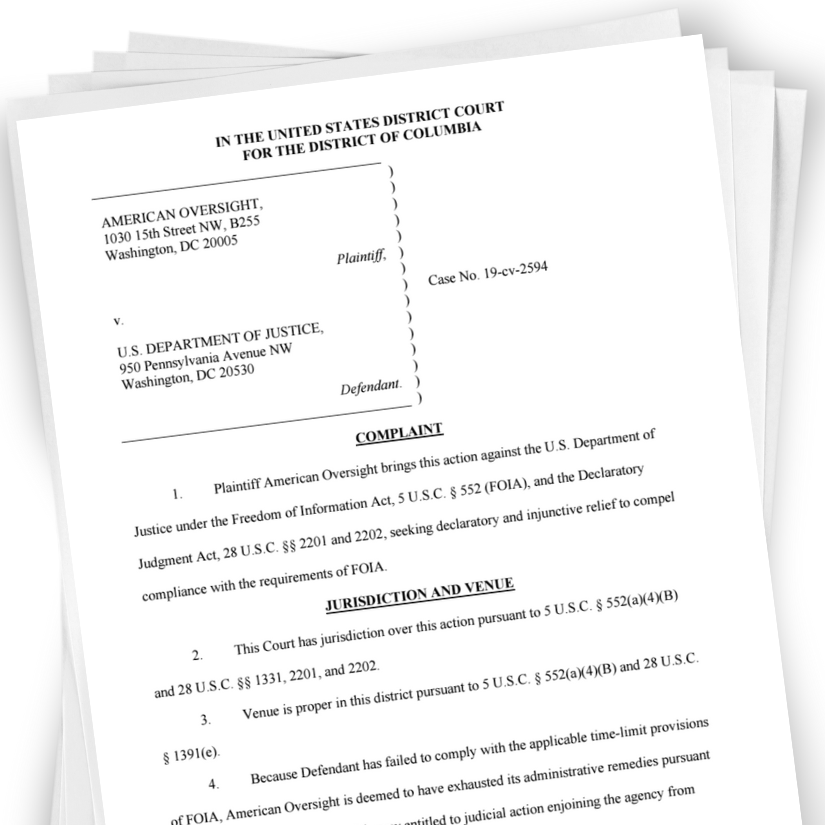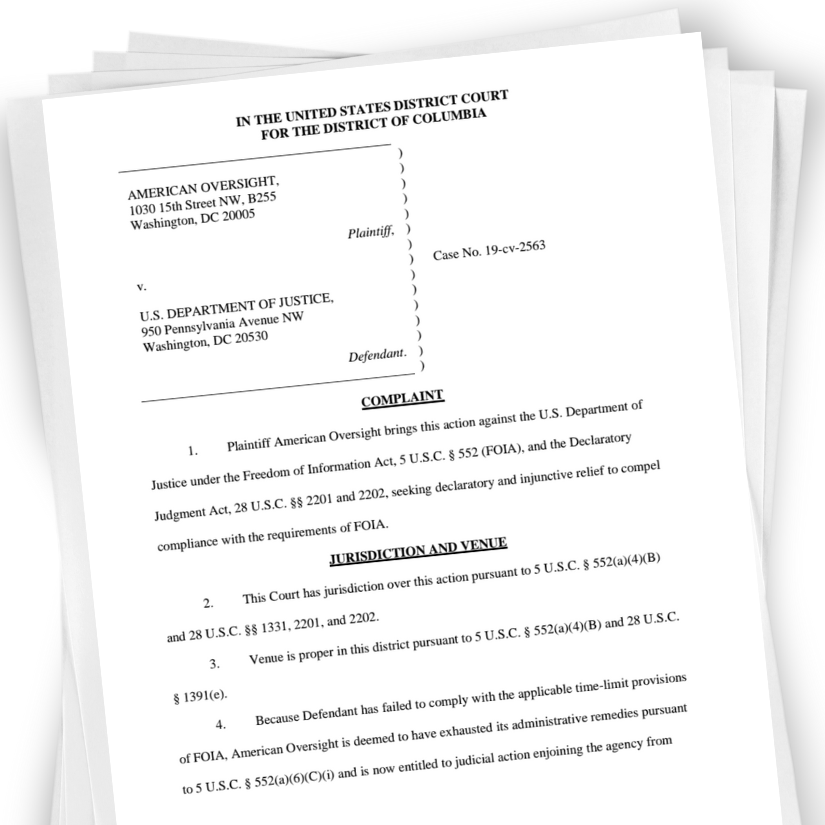
News Roundup: From the Top Down
Efforts to get Ukraine to investigate the president's perceived rivals have been known for months. We want to know how many were involved.

It’s been just over a week since the Washington Post reported that President Donald Trump’s communications with the Ukrainian government were the subject of an intelligence whistleblower complaint being withheld from Congress.
But while the evidence of Trump’s direct involvement in the push for a foreign government to attack his potential election opponents may be new — and revelatory enough to spur Tuesday’s announcement of a formal impeachment inquiry — such efforts on the part of his allies have been known for months (thanks in no small part to the public boasts of Trump personal attorney Rudy Giuliani).
American Oversight first began investigating back in May, when Giuliani canceled a planned trip to Ukraine. This was around the same time that the administration recalled the U.S. ambassador for what lawmakers have criticized as political reasons. Later that summer, reporting revealed that not only had Giuliani renewed his efforts to get Ukraine to investigate the son of former Vice President Joe Biden, but that a State Department official had assisted him in setting up a July meeting with a Ukrainian official. Meanwhile, Trump had ordered the freezing of hundreds of millions in congressionally approved military aid to Ukraine.
A rough transcript of a July 25 call, in which Trump explicitly asked Ukrainian President Volodymyr Zelensky to investigate Biden and suggested connecting Zelensky with both Giuliani and Attorney General William Barr, raised serious concerns that were compounded by Thursday’s public release of the whistleblower complaint. The complaint claimed that Trump endangered national security for personal political gain — and that White House officials tried to cover it up.
Trump’s personal encouragement of foreign election interference is alarming and unprecedented. But equally disturbing is the potential for Trump’s misconduct to have extended beyond one phone call, reshaping U.S. policy toward another nation and enlisting unknown numbers of other government officials, from the Justice Department to the U.S. Agency for International Development, in his mess. That has been at the heart of our ongoing investigation, and is what makes the allegations even graver than the president’s apparent contempt for the rule of law.
We know, by the White House’s and Giuliani’s own disclosures, that Trump himself played a role. Unlike major political scandals of the past, when the focus was on discovering how high up the chain the wrongdoing climbed, this time we’re looking into the extent to which the federal government contorted itself to assist the aims of the person at the top.
Since the beginning of this week, we have filed more than a dozen additional Freedom of Information Act requests to shed light on how wide the wake of corruption was, seeking communications from various agencies — including Barr and the Justice Department — with Giuliani and other key figures, or about their efforts. We’re also asking for information about the rescission of aid to Ukraine and the recall of former Ambassador to Ukraine Marie Yovanovitch. And we want those texts Giuliani was brandishing on cable news Thursday night.
While the impeachment investigation will be drawing a significant amount of attention in the coming days and weeks, Trump’s penchant for self-dealing and misconduct has been apparent since the beginning of his administration, infecting agencies across the federal government. Our investigations continue:
Parallel Investigations: During a House Natural Resources Committee hearing on the Interior Department’s failure to cooperate with congressional oversight requests, Rep. Debra Haaland pointed to department call logs that we obtained, which — unlike the version provided to Congress — were unredacted. “As you can see, the department provided a response to Congress that was blatantly incomplete and has not corrected it,” Haaland said. “Is this simply incompetence, do you think, on the part of the department, or do you think they’re purposefully withholding information from us?” In response to the administration’s broad resistance to congressional oversight, our Parallel Investigations Initiative is aimed at using FOIA and the courts to get the documents Congress has asked for so agencies can’t thwart accountability — and transparency is something the Interior Department has notably been avoiding.
What We Learned from Those Call Logs: The documents show that the president’s top offshore oil and gas regulator, Scott Angelle, had dozens of calls with energy industry groups. This is the same official who called companies “partners” and gave his cell number to industry representatives, reminding them to call because written communications are subject to FOIA. You can probably guess whether Angelle granted the same level of access to watchdogs or conservation groups, but here are the documents.
Sanctuary Cities: In April, Trump issued a statement that his administration was “giving strong considerations to placing Illegal Immigrants in Sanctuary Cities only,” contradicting prior statements by the White House and the Department of Homeland Security that such a proposal to transport migrants to sanctuary cities was not under serious consideration. We’re asking Homeland Security for communications officials may have had about the idea.
Gun Lobby and the White House: As the public continues to call for federal action on gun control, news outlets have reported that Michael Williams, a former lawyer for a gun silencer lobby group, has taken a lead role on White House gun policy. Williams was also a law clerk for the National Rifle Association’s Institute for Legislative Action. We want to know whether and to what extent he has talked with gun-rights advocates, including his former employers, while at the Office of Management and Budget.
Brian Hook: The U.S. special representative for Iran, Brian Hook, has drawn scrutiny during his time at the State Department. There have been accusations that he mistreated career staffers and a possible inspector general finding that he was involved in retaliation against officials for their perceived lack of loyalty. He has also participated in Jared Kushner’s irregular Middle East diplomatic efforts (about which we have open lawsuits). Given his apparently rising influence in the administration, we’re looking into his external communications to learn more about his actions at the State Department.
Hurricane Dorian: The furious pace of news might make you forget that the controversy over Trump’s insistence that Alabama had been in the path of Hurricane Dorian, which devastated the Bahamas, was less than a month ago. The infamous Sharpie-doctoring of a weather map culminated with a statement from the National Oceanic and Atmospheric Association chastising the National Weather Service in Birmingham, Alabama, for having contradicted the president — followed by the news that Commerce Secretary Wilbur Ross had threatened to fire top NOAA employees before the statement was issued. Needless to say, we want to know more about this potential abuse of power in the service of the president’s personal fixation.
Freezing Brooklyn Jail: Back in February, we began investigating freezing conditions at the Metropolitan Detention Center in New York during a January and February prolonged power outage, suing the Justice Department in July for failing to provide documents. This week, the Justice Department inspector general found that the jail had “longstanding” problems with its heating system. The U.S. Attorney’s office representing the Bureau of Prisons in the lawsuit has said we’re not entitled to the information we’ve requested. We of course disagree.
But … Back to Ukraine: The whistleblower’s complaint also contained information about Energy Secretary Rick Perry’s contacts with Ukraine. According to the whistleblower, Trump had told Vice President Mike Pence to cancel his trip to Ukraine for Zelensky’s May 20 inauguration and to have Perry lead the delegation instead. We already have active FOIA requests regarding that trip, and filed a new request this week to learn whether Perry also tried to persuade Ukraine to investigate Biden.
More Ukraine: The New York Times reported that Trump has been fixated on Ukraine since his election, “angry over what he sees as Ukraine’s role in the origins of the investigations into Russian influence on his 2016 campaign.” On Wednesday, the Justice Department said that U.S. Attorney John Durham, who has been investigating the origins of the counterintelligence probe of the Trump campaign, has been looking into the role that Ukraine played. We’re currently suing the Justice Department to shed light on Durham’s investigation and Trump’s potential misuse of federal law enforcement for political purposes.
New Documents
Florida Voting: We published records from the Collier County Supervisor of Elections Office, showing communications from the state director of elections, Maria Matthews, about voter roll maintenance.
Infrastructure Communications: We also published emails between the White House Council on Environmental Quality and congressional staff about the president’s early 2018 infrastructure plan, including communications between Senate Majority Leader Mitch McConnell’s office and the White House.

